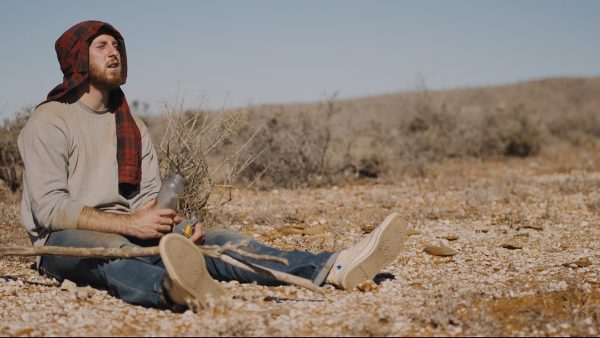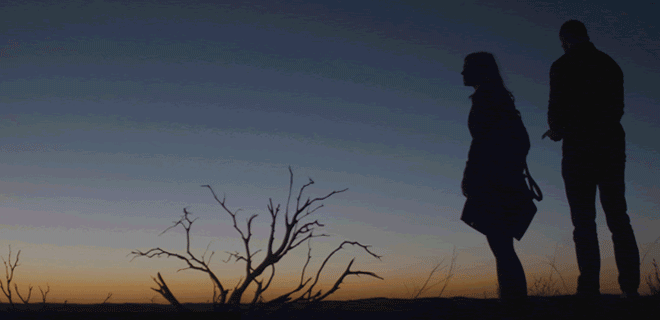
Australia’s tourism board must read movie synopses from behind their hands: Wolf Creek might not have been the first outback horror, but it’s become pretty well-known to a whole generation now, feeding into all the (true) stereotypes of a harsh, remote climate ready to isolate and endanger the unwitting and unwary, coupled with the (rather less accurate, hopefully) stereotype of the lone maniac who knows the landscape and might just kill for kicks. Well, take away the lone maniac altogether and you’ve still got the recipe for an unsettling film. This is the case in Outback, a film which underlines its point that if you wander off the beaten path, you’ve had it, unless a miracle comes along. Hell, you don’t even need to go very far. If you aren’t equipped, and if you’re – shall we say – a tad naive, then you’re potentially a goner. Such is the case here, in an ordeal based on a true story.
Unlike many ordeal/survival films, we aren’t faced with a group of happy friends or a loving couple who have their love and loyalty tested by incoming circumstances, because in the case of Wade (Taylor Wiese) and his fiancee Lisa (Lauren Lofberg), they’ve already hit a pretty big bump in the road, even before arriving in the country. Childhood sweethearts, Wade decided to pop the question on the flight over; Lisa however turned him down. Needless to say, things are a little frosty after this point, as they embark on their holiday of a lifetime. Wade is coping by shutting down completely; clearly hurt, he can barely bring himself to speak at all. Lisa is coping by reverting to inane conversation, as if nothing ever happened and as if it will all be just fine, if they avoid tackling their very big problems head on. Whilst most of us, hopefully, won’t end up stranded in a deadly environment at any point during our lives, we might still recognise the hell of the awkward silence. Perhaps to break its momentum, Lisa proposes a change to their trip: why not go to Ayer’s Rock, or Uluru to give it its proper name? Sure, it’s a few hundred kilometres out of their way, but they have a decent vehicle, fuel and most importantly of all, the modern altar: a sat-nav. For reasons best known to himself, Wade entertains this momentary madness, and so they begin their (new) journey, on roads which increasingly look less and less like they have been designed for cars…
Convinced that his tech could not let him down, Wade begins to follow the sat nav in circles, until daylight is almost running out and the pair are growing more and more disorientated. Now, here is where the couple begins to make a series of deeply stupid decisions, decisions which form the bedrock of all the other stupid decisions to follow (and I hope that isn’t a spoiler, but this would probably not be a film we’d cover here if a couple of tourists simply had a lovely time at a popular Australian landmark).

They decide, towards the end of day, to get out of the car and hike to the top of a nearby mountain, in the hopes of being able to see a light or some evidence of a nearby road. As darkness draws in and the unadulterated outback night masks everything, they inevitably cannot remember where the car was. Problem number one. Without adequate clothing, a long-life flashlight, a sleeping bag or any substantial food or water, they’re immediately in trouble. Thus begins a chain of events which, considering they take place in vast expanses of deserted landscape, feel oddly claustrophobic (the film frequently shows us via overhead shots just how tiny and insignificant humans are here, and that’s without Lisa alluding to the same fact in the script). The emphasis is often on the small-scale, focusing on interactions between Wade and Lisa; he tends to know best, right up until he doesn’t, whilst she does her best to rise to the challenges of the situation, but often reverts to insecurity and fear.
These human relationships are placed under a pretty extraordinary microscope and, by and large, the two actors sustain audience interest in their plight. The surrounding environment is stark and beautifully shot, whilst director Mike Green knows just how to intersperse the inevitable lulls in movement and action with something foreboding and downright physically harmful; both Wade and Lisa are physically threatened and harmed by their plight in a range of gruesome and unpleasant manners. However, any sympathy you might have for these two is dampened a little by, well, marvelling just how stupid they’ve been. If most horrors or thrillers contain the odd daft decision, the kind of thing where you almost cannot believe anyone would do it, then Outback does it far more frequently than ‘the odd time’. This is based on a true story, too, and this intermingles with your assessment of character behaviour; you can’t get too exercised, as this really happened to real people, people who clearly suffered a great deal. Mixed emotions result, particularly just before the credits roll and you find out about the final outcomes here.
So – a frustrating watch at times in terms of its key players, but still a tense, decently-made film which makes good use of its shooting location and joins a proud tradition of Australian films which, if they don’t put you off completely, might make you think carefully about taking on this landscape. Or, you know, implicitly trusting your sat nav.
